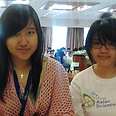
Originally initiated by a number of Nobel Prize Laureates in the sciences from Eastern Asia, it was Israel’s first time hosting the science camp as it has been traditionally held in a different Asian country for the past six years.
High school and university students arrived from 23 different countries-- including nations with which Israel does not have diplomatic relations such as Indonesia.
Shannon Canumara, 16, of Jakarta, Indonesia, described the science camp as fascinating. “The lectures have been fantastic. It’s very different from a high school environment, because we get to learn about science not only from textbooks. We actually get to question the professors and their theories,” Canumara told Tazpit News Agency.
Her Indonesian counterpart, Vinsen, 17, added that “even though our country does not have diplomatic relations with Israel, everyone here was so welcoming to us. I hope that someday Indonesia will agree to establish diplomatic relations with Israel in the future.”
Some of the largest student delegations came from China, India, Korea and Japan, while smaller delegations from Turkmenistan, Turkey, Sri Lanka, and New Zealand also participated.
The Israeli delegates, who were chosen according to a strict criterion of academic excellence in science, consisted of 35 Jewish and Arab students from across the country including periphery cities like Carmiel and Yeruham, as well as east Jerusalem and Umm al-Fahm.
The science camp featured lectures from five Nobel Prize Laureates in the Sciences from Israel and abroad, including one of the founders of ASC, Taiwan’s Professor Lee Yuan-Ti, Nobel Prize Laureate for Chemistry, as well as Prof Makoto Kobayashi (physics) from Japan, and Israel’s Prof Aharon Chechanover (medical-chemistry) and Prof Israel Uman (game theory) and US professor, Roger Kornberg (biology).
'Science has no boundaries'
Liangjin Zhao, a second year university student in Beijing, studying electronic engineering, was very impressed with the organization of the science camp. “Although we’ve had little free time, the best part has been to network and make new friends from all over the world. There is such a great combination of people here” Zhao said.
Sitting beside her was Noy Moisa, a student at Hebrew University High School of Jerusalem, who agreed wholeheartedly. “We already started connecting with the students via Facebook and e-mail before the camp even began,” Moisa said.
Rawan Mahajna of Um Al Fahm, 19, who plans to study medicine, said the science camp was an opportunity for “connecting minds together and meeting people who share similar science interests.”
“Everyone here speaks the language of science, which goes beyond skin color, religion, background, and politics. I’m really thankful for this experience,” Mahajna said.
“The whole concept of this science camp was to show that science has no boundaries,” said Reut Inon-Berman, one of the organizers of the Asian Summer Camp. “Together, we can get that much further in this field."
Reprinted with permission from the Tazpit News Agency















